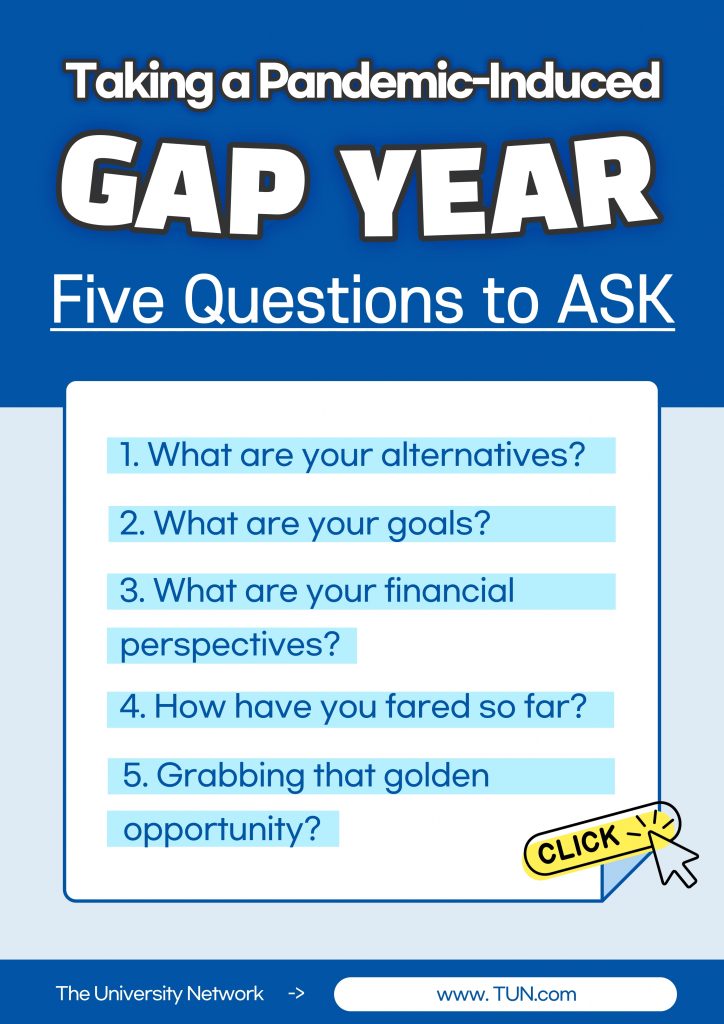As safety measures continue to fluctuate across the nation, high-school graduates, college-transfer students, and working adults alike wonder whether they should take a gap year or gap semester and just wait out this unprecedented tide until we collectively land in more conventional waters. So far, 2020 has yielded a surge of three times the usual trend — about 40 percent of students are taking a gap year across the board, according to a recent study by Simpson Scarborough.
There is, of course, something to be said for both options: a gap year provides the chance to reconsider future actions, such as making more deliberate and informed decisions about career directions. At the same time, we are all highly aware of the concept “time is money,” and letting a year slip by with no clear idea when and if things will return to pre-COVID times can cause a dreadful delay in the realization of progression plans.
Taking a gap year is particularly appealing when you are used to an engaging face-to-face learning environment with ample opportunity to socialize in-between lectures and establish rewarding connections. In his article on Forbes.com, Michael Nietzel articulately summarized student engagement in higher education as a blend of “extended, intensive experiences like research assistantships, mentoring, study away, service learning, senior projects, or taking part in a themed learning community.”
Online learning, to some, just doesn’t have as much appeal as sitting in a classroom and having the opportunity to exchange a funny remark, discuss an experience you had on the way to campus, participating in a study group or mentor-session on campus, or going for a bite or drink together after class. Indeed, human beings are social creatures, and many of us are finding ourselves reminiscing about the days that we could fearlessly interact, completely ignorant of current terms of social distancing, masks and pandemics.
Yet, there is also a lot to be said about swooping ahead while others are waiting things out. Time waits for no one, and the sooner you can acquire that degree that will warrant career progress, the sooner you can make your moves. Besides, there have been increased efforts in recent months to format the online education requirement in such a way that there is ample synchronous communication, with dialogue space and break-out rooms in Zoom sessions for closer, student-centered interaction.
Yet, it remains a tough decision for some, so here are five reflective questions that can assist you in deciding whether college should be a step for now or later.

1. What are your alternatives?
If you would merely sit at home without a job or another intriguing opportunity, college may be the way to go in order to put your time to good use. If you do have a job or other rewarding alternative, and feel that juggling multiple challenges at the same time in a virtual world will diminish your performance and chances of success, then perhaps a delay might be the wiser choice.
2. What are your goals?
Are you an ambitious go-getter who wants to accomplish progress as soon as possible and dreads setbacks? If so, the choice is self-explanatory — you enroll now rather than later. Are you still unsure about what you would like to do with your future, and might you need some time to mull things over? Then maybe waiting a semester or two can be useful.
3. What are your financial perspectives?
If you are already in the process of accruing student loans, you may want to finalize your educational journey sooner rather than later, so that you can start paying off those loans upon earning your degree and finding a (better) job. If monetary pressures and financial aid issues are not part of your concerns, you may decide to wait and see things through for some time.
4. How have you fared so far?
If your college performance has thus far been disappointing due to stressful circumstances around you, taking a leave may be a welcome solution to regroup your thoughts, and possibly consider whether the direction you elected some time ago is still the one you want to pursue. Your interests may have shifted, and taking some distance to refocus may serve as an eye opener. On the other hand, if you have done well so far, and you can pull through with decent grades in spite of the current challenges, there is no need to delay.
5. Grabbing that golden opportunity?
Every so often there is a marvelous opportunity that emerges. One that you simply cannot turn away from: a super internship or job experience that may very well be the foundation for a dream career; a chance to acquire alternative training that will splendidly supplement your future degree; or one of the non-career based highlights in life, such as marriage, childbirth or travel. When once-in-a-lifetime opportunities arise, it may be more appealing to go for them and make your gap year a time to discover and explore.
The five questions above will lead to different answers for each reader, and that’s a great thing because we’re all empowered to live our own lives. Ultimately, the choice is very personal and it’s important to consider all options and keep in mind that all future paths are a consequence of the choices you make today.
[simple-author-box]



